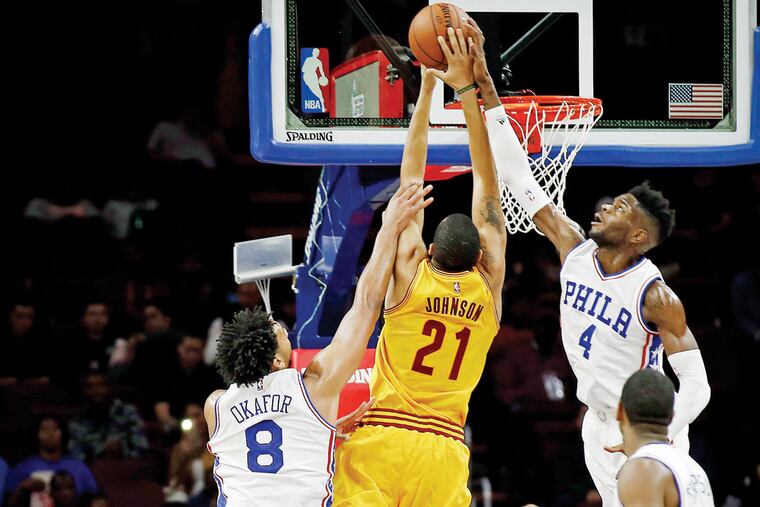Good Stuff: Sixers winning off the court, if not on it
The 76ers likely will lose many basketball games in their NBA season, which begins Wednesday, but the off-court team business looks promising.

The 76ers likely will lose many basketball games in their NBA season, which begins Wednesday, but the off-court team business looks promising.
The team's local revenue is rising, team executives say without disclosing numbers, because they have invested in the business side since Josh Harris' group bought the team in 2011. Having a player payroll that is near the league low also helps.
Beyond local efforts to keep and attract season ticketholders and corporate sponsors, the franchise value rose from $469 million to $700 million in the last year, according to Forbes, because the National Basketball Association last fall signed a nine-year, $24 billion TV contract with ESPN that starts next season. That ranks the Sixers' value No. 27 out of 30 NBA teams. Forbes estimated the Sixers' 2015 revenue at $125 million and operating income at $24.4 million.
Sixers CEO Scott O'Neil said he imagines a day when the Sixers' on-court success could be live-streamed over the Internet directly to paying fans/customers, while skipping the regional sports network. For now, and through 2029, the Sixers are tied to Comcast SportsNet Philadelphia.
"The basic backbone of sports has been built on media deals," O'Neil said in a recent interview in his office at the Navy Yard. "If you look at the viewing habits over the last five years and those projected over the next five years, you can make an argument that sports will be the one piece holding the current infrastructure of television and cable together."
Brian Roberts, CEO of Philadelphia-based Comcast Corp., the parent company of CSN, certainly hopes so.
"Yes, and he's made several bets to that extent," O'Neil said. "As that business changes, our business has to search for revenue streams through that tumultuous time. You've seen leagues start to experiment with different things."
On Sunday, the NFL live-streamed online an entire football game, through Yahoo!, for the first time.
The Sixers and five other NBA teams had all their 2014-15 games live-streamed through a Comcast regional sports network. As of now, though, CSN Philadelphia - and not the Sixers - gets the revenue from the live-streaming of games, and the Sixers get promotional spots, said CSN Philadelphia president Brian Monihan.
According to CSN Philadelphia's data from last season, there were 45,000 live streams of Sixers games for a total of 1.8 million minutes over 82 games, with 70 percent of the live starts and 53 percent of the live minutes coming from mobile devices.
"Scott has great vision and we feel we are great partners," Monihan said of O'Neil, adding that on-court wins would help each business.
O'Neil, with help from team revenue chief Christopher Heck and marketing chief Tim McDermott, said he was building a business operation that will push the Sixers higher when the on-court performance improves. Season-ticket sales have doubled in the last two years. DraftKings, StubHub, the Rothman Institute, and Thomas Jefferson University Hospital are key sponsors this season, at an average of about $1 million apiece.
PricewaterhouseCooper predicted this month that media rights revenue would exceed ticket revenue for North American sports leagues by 2018.
O'Neil did not mention CSN Philadelphia by name, but later he said the partnership was good. Still, at his direction, the Sixers now call their home arena "The Center," leaving out the "Wells Fargo" part because the bank pays Comcast for the naming rights but not the Sixers.
His comments come as debate swirls at the business intersection of media, sports, and technology regarding cord cutting, in which customers drop cable TV and use only the Internet. Comcast is also a dominant Internet provider in this area, but it does not control every Internet pipeline nationwide.
"What's interesting for us is that the local RSN [regional sports network] will come under more pressure than the national (provider), I think," O'Neil said. "If they do, at some point, something is going to break."
Other NBA owners are also positioning themselves as technology evolves. Los Angeles Clippers owner and former Microsoft CEO Steve Ballmer, who paid $2 billion for the franchise, reportedly turned down a $60 million-a-year offer from Fox Sports West. Ballmer is exploring whether he can bypass Fox, live-stream Clippers games, and generate enough revenue to offset the production costs that would shift to him from Fox.
"If you talk to our young aspiring superstars," O'Neil said of the Sixers' players and sales reps, "they are all the same age and ask them how many have cable TV. It would be an interesting discussion. They pull most stuff off the Web, which means their phone."
215-854-4506@davidcsell